ZTE aims at bigger share in neighbors
Updated: 2013-10-04 23:27
By Shen Jingting (China Daily)
|
||||||||
ZTE Corp, the world's fifth-largest telecom equipment and smartphone manufacturer, has steadily increased its footprint in Indonesia and Malaysia, and hopes to achieve greater success in the countries in the near future.
Since ZTE's pioneering employees began exploring the Indonesian market in the late 1990s, PT ZTE Indonesia has grown into one of ZTE's largest overseas subsidiaries, with a competitive staff, complete organizational structure and significant turnover.
But to achieve this accomplishment was by no means an easy task. At the beginning, ZTE had difficulty breaking into the local market. The situation improved significantly between 2006 and 2007, as the company achieved $200 million in annual sales in 2006 and doubled its revenue the following year.
Mei Zhonghua, president director of PT ZTE Indonesia, said the company now has a clear focus in Indonesia on three major fields — the telecom carrier market, the terminal market and enterprise ICT solutions.
PT ZTE Indonesia has so far established close cooperation with major operators in Indonesia, including PT Indosat, PT Telkom and PT Telkomsel. Between 2010 and 2012, ZTE was the sole equipment supplier to PT Telkom's Fiber to the Home project.
Meanwhile, ZTE has made a significant breakthrough in the mobile terminal market in Indonesia. "We expect to sell more than 200,000 smartphones in the country this year," Mei said in a telephone interview.
He forecast that ZTE would achieve an annual growth rate of 50 percent in terms of smartphone sales in Indonesia in the next couple of years.
Globally, ZTE shipped 10.1 million smartphones, 4.2 percent of world's smartphone market, in the second quarter of this year, according to an IDC report. The Shenzhen-based cell phone vendor was the fifth-largest smartphone company worldwide, behind Samsung Electronics, Apple Inc, LG Corp and Lenovo Group. ZTE aims to ship 50 million smartphones this year.
In Malaysia, ZTE is one of the main suppliers to TM for the broadband network, and ZTE is also major supplier to DIGI, UMOBILE and P1 for the cellular network. Recently ZTE rolled out the commercial LTE (Long Term Evolution) network for DIGI, and very soon will help Umobile launch the LTE commercial network.
Fred Zhang, managing director of ZTE Malaysia Corp, said the biggest opportunity for the company in Malaysia is that the nation is in a new period of 4G wireless network construction. "For ZTE, we not only help our telecom carrier clients to deploy network infrastructure, but also we want to provide them with in-depth applications based on 4G network," he said.
"By cooperating with local government and enterprises, we hope to help build Malaysia as a regional hub for cloud services and data centers."
ZTE said it highly valued the importance of creating jobs and strengthening localization in both Indonesia and Malaysia. ZTE now has around 500 employees in Indonesia, of which 60 percent are local hires.
- ZTE voices continued support for Nigeria police against crime
- Huawei, ZTE win another infringement lawsuit
- ZTE, Huawei win big in 4G network tender
- Telecom giant ZTE releases profit forecast
- ZTE's '1st-time' phones on eBay
- ZTE's net profit soars in the 1st half
- How ZTE is winning the US market
- ZTE, Huawei address US IT security concerns

 Storm swamps car insurance firms
Storm swamps car insurance firms
 Smartphone firm rockets into the US
Smartphone firm rockets into the US
 3 US economists share 2013 Nobel Prize in Economics
3 US economists share 2013 Nobel Prize in Economics
 Canton Fair to promote yuan use
Canton Fair to promote yuan use
 Vintage cars gather in downtown Beijing
Vintage cars gather in downtown Beijing
 Riding the wave of big bargain buy-ups
Riding the wave of big bargain buy-ups
 Senate leads hunt for shutdown and debt deal
Senate leads hunt for shutdown and debt deal
 Chinese education for Thai students
Chinese education for Thai students
Most Viewed
Editor's Picks

|

|

|

|

|

|
Today's Top News
UK 'open' to Chinese nuclear investment
All 86 tourists evacuated from Mount Qomolangma
Obama hopeful as meeting nears with lawmakers
Canton Fair to promote yuan use
Over 380 detained in Moscow riot
86 trapped at Mount Qomolangma camp amid snow
Going green can make good money sense
Window cracks for progress in Iran
US Weekly

|

|








